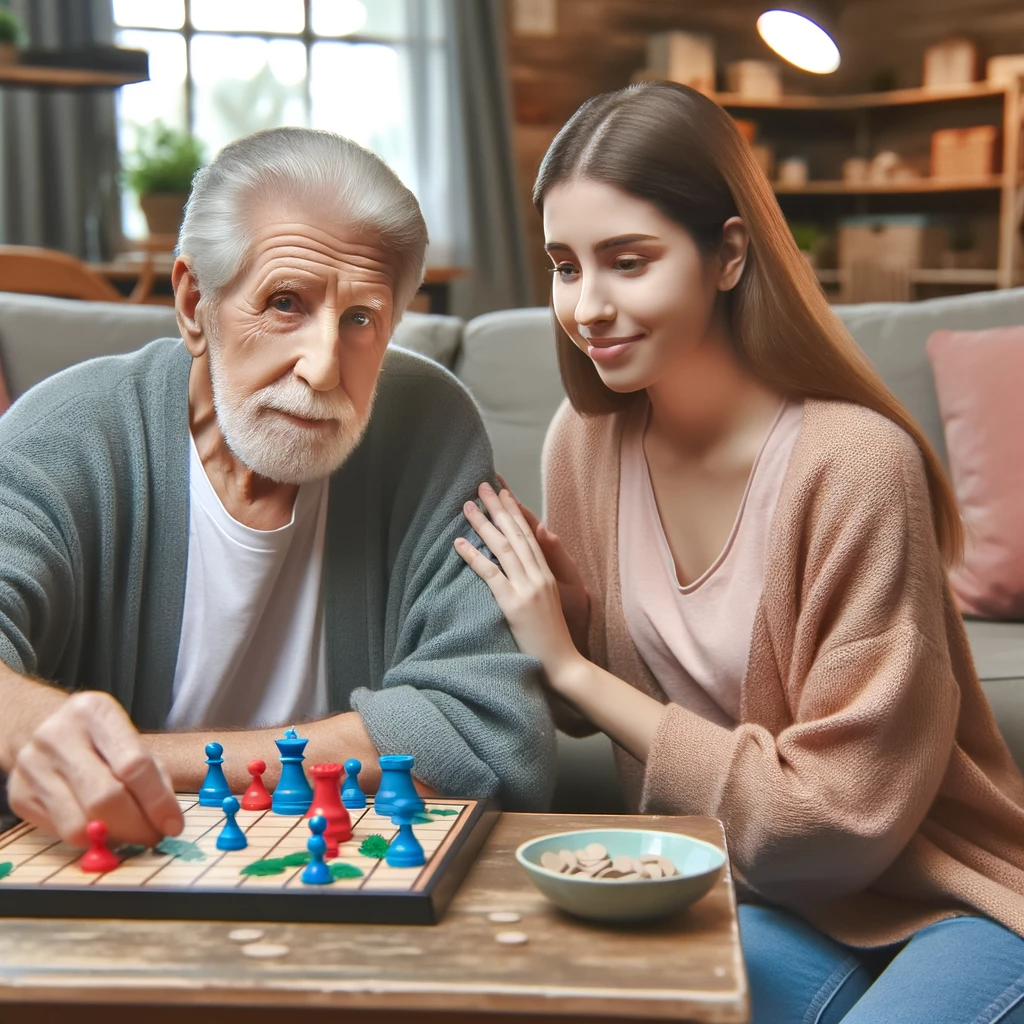Dementia How to Care for a Self-Isolating Family Member
This guide offers practical tips on empathetic communication, creating a safe and familiar environment, and engaging in activities that help break the isolation barrier for dementia patients

This is a question from Mike,
Hi,
Thanks for your website and help over email. This is a huge help for the public.
I'd appreciate your thoughts on how I can reach out to a friend who has dementia who is self-isolating.
Here's some context.
He began self-isolating about a year ago. He's a proud, highly autonomous person, with a big heart. He's single, lives alone, and hasn't responded to my calls or emails for about a year. He mentioned about two years ago that he was diagnosed with dementia, but I didn't notice any signs in his behavior, until our last few conversations. He left his job as professor in this past year, so I'm pretty sure dementia is the issue.
I'm wondering if I can find a way to break the ice in email, or in voicemail, so allow him to feel comfortable speaking in his diminished state. Something along the lines of how important it is to me that we connect, since I suspect what he's going through is hard. And to not worry about any difficulty hew might have on the call. Maybe this is too direct?
Looking forward to your response!
-Mike
Response
Hi Mike, thanks for showing such concern for a good friend.
Dementia, a condition marked by a decline in memory, thinking, behavior, and the ability to perform everyday activities, often leads to unique challenges, one of which is self-isolation. Caring for someone with dementia who is self-isolating requires understanding, patience, and a tailored approach. This article aims to provide insight and guidance on how to care for someone with dementia, especially when they are prone to self-isolation.
I have written more on this subject below.
Warm Regards,
Diane Carbo RN
Understanding Self-Isolation in Dementia
Self-isolation in dementia patients can be a result of various factors, including confusion, fear, depression, or a desire to not burden others. As cognitive functions decline, individuals may find it difficult to communicate or engage with others, leading them to withdraw into themselves.
The Role of Friends and Family
Friends and family play a crucial role in caring for dementia patients at home. It's important to recognize the signs of self-isolation and understand how to address them effectively.
John, a Former Professor
John, a retired professor, was diagnosed with dementia two years ago. Known for his independence and intellect, his transition into isolation was gradual but noticeable. Friends like Mike, who were once a regular part of his life, found it challenging to maintain contact. This is not uncommon. There are things you can do to help a person suffering from dementia to overcome this.
Dementia How to Help : Strategies for Overcoming Self-Isolation
Initiate Contact with Empathy
- Approach Gently: Start with a simple email or voicemail, expressing your desire to connect. It's important to be direct yet sensitive. For instance, Mike could say, "I've been thinking about our past conversations and would love to catch up whenever you feel comfortable."
- Be Consistent: Regular contact, even if not reciprocated initially, can provide a sense of presence and support.
Create Comfortable Communication Channels
- Familiar Modes: Use communication methods that the person is most comfortable with. If they preferred emails or phone calls before dementia, continue with that. Have a discussion with his primary caregiver. Ask if you could come take John out for a meal, or a walk or ride just to get out.
- Simple Language: Use clear, straightforward language avoiding complex topics that might be overwhelming.
Encourage Social Interaction
- Small Group Visits: Organize small gatherings with close friends or family. Familiar faces can be comforting. Ask John's primary caregiver if you could bring a few of his colleagues for a visit. Or perhaps take him out with a few friends.

Engage in Activities: Engaging the person in activities they used to enjoy can be a way to stimulate interaction.
Patients with dementia can greatly benefit from games and social interactions. These activities are not just forms of entertainment; they play a crucial role in maintaining cognitive functions, emotional well-being, and overall quality of life. Here's an elaboration on these benefits, along with some dementia caregiver tips.
Benefits of Games and Social Interactions for Dementia Patients
- Cognitive Stimulation: Games that challenge memory, problem-solving, and attention skills can help keep the brain active. This stimulation can potentially slow down the progression of cognitive decline in dementia patients.
- Emotional Well-being: Social interactions and engaging in games can provide a sense of joy and achievement. These activities can help reduce feelings of isolation, depression, and anxiety, which are common in dementia patients.
- Physical Health: Many games involve a physical element, whether it's simple hand movements or more active engagement. This can help maintain motor skills and overall physical health.
- Social Bonding: Engaging in games and social activities provides opportunities for meaningful interaction with others, fostering a sense of connection and belonging.
- Routine and Structure: Regularly scheduled game times and social interactions can provide a comforting routine, which is beneficial for dementia patients who thrive on structure.
- Reminiscence and Recall: Games that involve recalling past events or information can help in tapping into long-term memory, which is often less affected by dementia.
Dementia Caregiver Tips
Choose Appropriate Games: Select games that are suitable for the dementia patient’s current abilities. Avoid overly complex games that might cause frustration.
Encourage Social Interaction: Facilitate opportunities for the patient to interact with family, friends, or join group activities, while being mindful of their comfort level with social settings.
Create a Supportive Environment: Ensure the gaming environment is safe, well-lit, and free from distractions that might be overwhelming.
Be Patient and Positive: Offer encouragement and celebrate small victories to boost their confidence. Avoid correcting mistakes too often as it can lead to frustration.
Incorporate Variety: Mix up different types of games and activities to keep things interesting and cater to different skills and interests.
Monitor Responses: Pay attention to how the patient reacts to certain games or social situations. If they seem distressed or uninterested, it might be time to try something different.
Use Technology: There are many apps and digital games designed specifically for dementia patients that can be both entertaining and beneficial for cognitive skills.
Encourage Physical Activity: Include games that involve gentle physical activity like walking, stretching, or simple dance moves to promote physical health.
Focus on Enjoyment, Not Achievement: The goal is to have fun and engage, not to win or be competitive.
Seek Support: Don’t hesitate to reach out to dementia support groups or professionals for more ideas and support in caring for someone with dementia.
By incorporating games and social interactions into the care plan for a dementia patient, caregivers can significantly enhance their quality of life, providing not only cognitive benefits but also emotional and social stimulation.
Professional Guidance
- Consult Healthcare Professionals: Seeking advice from doctors or dementia care specialists can provide tailored strategies for dealing with self-isolation.
Educate Yourself and Others
- Understand the Condition: Learning about dementia helps in managing expectations and preparing for various stages of the condition.
- Spread Awareness: Educating other friends and family about how to interact with someone with dementia is crucial.

Addressing Specific Challenges
Caring for a Dementia Parent at Home
- Creating a Safe Environment: Modify the home to make it safe and comfortable.
- Routine and Structure: Establishing a daily routine can provide stability and a sense of normalcy.
Dementia Caregiver Tips :Dealing with Behavioral Changes
Identify Triggers: Understand what triggers withdrawal or discomfort and try to mitigate these factors.
Professional Help: Sometimes, consulting with a therapist or counselor who specializes in dementia care can be beneficial.
Support for Caregivers
- Seek Support Groups: Connect with local or online support groups for dementia caregivers.
- Respite Care: Consider arranging respite care to take breaks and avoid burnout.
Adapting to Progressive Changes
- Stay Informed: As dementia progresses, the care strategy may need to be adjusted. Stay informed about the latest care techniques and therapies.
Conclusion
Caring for a self-isolating dementia patient is a journey that requires compassion, understanding, and adaptability. By initiating empathetic contact, creating comfortable communication channels, and engaging in social interactions, caregivers can significantly impact the well-being of the person with dementia. Remember, each individual's journey with dementia is unique, and the care approach should be personalized to their specific needs and preferences.
You might also like this article:








